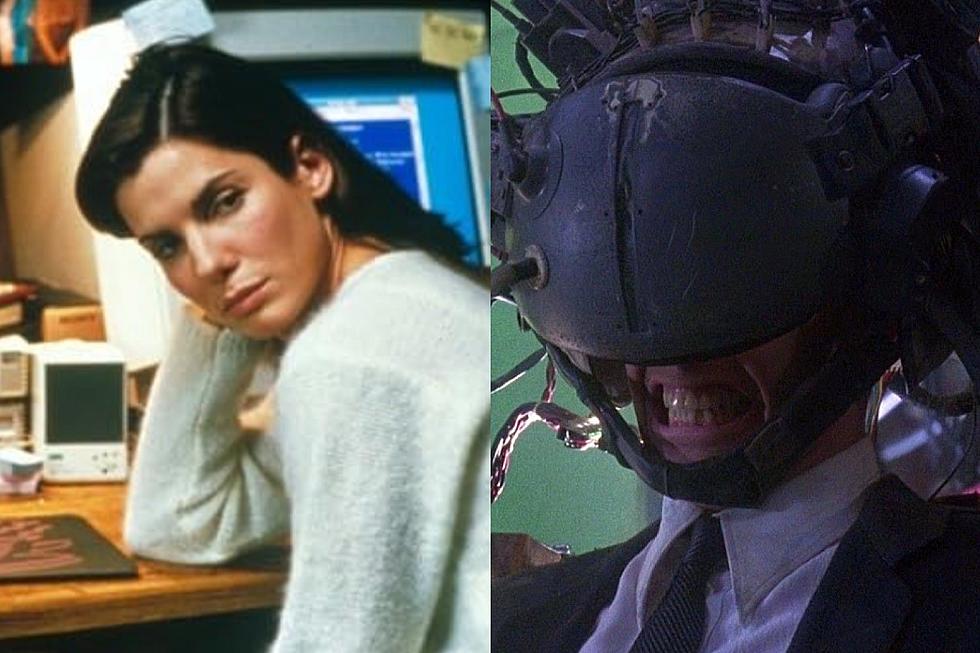
Reel Women: Getting ‘Under the Skin’ of Scarlett Johansson’s Ill-Fated Transformation
Director Jonathan Glazer's 'Under the Skin' stars Scarlett Johansson as an apathetic alien named Laura, who uses her earthly female body to seduce men and lead them to their death. The film is an oft abstract and unnerving experience (especially in the wonderfully bizarre first hour), and when Laura makes a surprising decision, 'Under the Skin' shifts from examining ideas of subjective and intangible attraction to the tragedy of Johansson's femme fatale trying to claim her sexuality -- and her body -- as her own.
We first meet Laura as an alien creature who feels no empathy or compassion for human life, as she takes the clothes from a dead woman's body to use as her own and leads men into a pitch black room where they become sucked into a liquid abyss, the purpose of which is never clearly defined. The film is based on Michael Faber's book of the same name, which reveals a larger backstory to the alien -- she is sent to Earth by an intergalactic corporation on a mission to harvest human muscles, a delicacy on its home planet. However, Glazer ultimately decided to scratch most of these details off from his screenplay and focus solely on fresh, naive eyes observing our familiar world and watching Laura's transformation from an "it" to a "she."
In 'Under the Skin,' Laura is initially immune to humanity, but her eyes betray a curiosity inherent in all life. It's during the prelude to the film's second half, when she meets and attempts to seduce a disfigured man, that Laura makes a startling decision, and the film's narrative reverses as she struggles to identify with humanity and take agency over her own body and sexuality.
But the tragedy is that the very body she inhabits and uses to attract men exists only to be objectified. She finds no pleasure for herself, as her earthly body is intended to serve the singular purpose of pleasing and attracting others. Johansson herself, like many actresses, knows all too well about what it is to be objectified and about the ongoing struggle to claim and define her sexuality as her own, rather than to exist as a piece of attractive lure to bait and entice men. Like Laura, Johansson is keenly aware of her own attractiveness, but she doesn't want to be defined by it, often choosing roles that play up her intelligence and strength. Later in the film, as Laura wanders off from her mission, she walks through the rain and mud, becoming more and more disheveled, as if she actively wants to avoid attracting anyone.
Laura's story, while metatextual, also reflects the struggles of young women -- Laura can be seen as coming of age, as naive to the ways of the world as she is. She studies her body in the mirror at length, captivated by this form and the power it holds over men, trying to understand her own body and its purpose and why it is so alluring. And like many young women, Laura knows that her body can attract men, but she doesn't yet understand how to take agency over it or how to use it for her own pleasure -- or that it can be used for her pleasure. What many young women -- and boys -- don't comprehend is that women don't merely exist to please men.
The ultimate tragedy comes later, as Laura lets her guard down to try and live as a human and is attacked by a stranger. The assault breaks her, literally, revealing her true form, and inciting a terrifying incident that speaks to the impulsive but sadly inherent nature of man to fear what’s under the female’s skin, so to speak, and to let that fear dictate their actions, manifesting as repulsion and dismissal. The scene is beautifully layered in metaphors about sexual assault, and the way assault tears a woman apart and reveals something so dark and delicate that can be terrifying if you don't understand it; it is perhaps also a metaphor for transgender issues and hate crimes, as her attacker perceives Laura as a beautiful woman, but upon discovering her true form, is repulsed and reacts violently. So preoccupied are men by the beauty on the outside that they fear and reject the truth underneath.
This horrific display is heartbreaking, but brings the film full circle: during the first hour, we watched as Laura drove around Scotland in her van, picking up men and seducing them, her selection process based on an intangible idea of attraction rather than a superficial one. But that isn't reflected back in the men she chooses, who are all too happy to blindly follow a sexy woman home, regardless of who she really is. She is incredibly selective, while they are less discerning, reflecting unfortunate real world gender dynamics. This exploration of the subjectivity of attraction in the first hour is reflected in Glazer's abstract presentation, but as the film -- like Laura -- evolves, it becomes something more grounded. The glossy and surreal sci-fi sequences represent and work in tandem with the fantasy of Laura's female agency and the conceit of subjective attraction, while the latter half of the film ditches the abstract and represents reality with dull, depressing clarity -- Laura moves from one half of the film to the other through a thick sheet of fog, clearly defining the two periods of her existence.
'Under the Skin' is a surprisingly poignant, layered and heartbreaking work that uses science-fiction to explore feminist themes and gender dynamics in ways that feel innovative -- there's never been a film like this, one that's taken these themes of being a woman and trying to take agency over ourselves, and aptly refracted them through the lens of an alien inhabiting a foreign skin; reconciling who we are on the inside with the body we've been given on the outside, a body that seemingly exists to be objectified -- a body that doesn't feel like our own.
More From ScreenCrush









